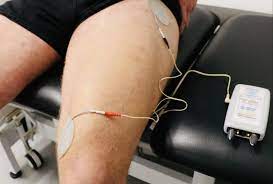 Researchers from the Orthopaedic Research Institute (ORI) have contributed to a new publication exploring the role of electrical stimulation in musculoskeletal populations. The chapter, authored by Dr. Louise Burgess, Professor Tom Wainwright, and Professor Ian Swain, examines the potential benefits of neuromuscular electrical stimulation (NMES) as a rehabilitation tool for individuals with musculoskeletal conditions, including osteoarthritis, joint replacement recovery, and soft tissue procedures.
Researchers from the Orthopaedic Research Institute (ORI) have contributed to a new publication exploring the role of electrical stimulation in musculoskeletal populations. The chapter, authored by Dr. Louise Burgess, Professor Tom Wainwright, and Professor Ian Swain, examines the potential benefits of neuromuscular electrical stimulation (NMES) as a rehabilitation tool for individuals with musculoskeletal conditions, including osteoarthritis, joint replacement recovery, and soft tissue procedures.
The chapter, titled Electrical Stimulation in Musculoskeletal Populations, is part of the book Techniques and Technologies in Electrical Stimulation for Neuromuscular Rehabilitation. It provides a detailed review of how NMES can be used to support rehabilitation by preserving or restoring muscle strength and function in patients experiencing muscle atrophy due to disuse, surgery, or injury.
Key highlights from the chapter include:
- The mechanisms behind muscle atrophy in musculoskeletal conditions and how NMES can counteract these effects.
- Evidence supporting the use of NMES in orthopaedic surgical populations, such as total knee and hip replacement patients.
- The role of NMES in conditions such as osteoarthritis
- Practical considerations for implementing NMES in clinical settings, including optimal stimulation parameters and patient adherence strategies.
Professor Tom Wainwright commented:
“This chapter consolidates the latest evidence on NMES and provides a valuable resource for clinicians and researchers looking to integrate electrical stimulation into musculoskeletal rehabilitation. NMES has significant potential to aid recovery for patients who struggle with voluntary exercise due to pain or mobility limitations.”
The full chapter is available as part of the Techniques and Technologies in Electrical Stimulation for Neuromuscular Rehabilitation book which is edited by Professor Ian Swain, and also includes chapters from colleagues at BU (The use of Electrical Stimulation in spasticity management, by Dr Kathryn Collins and Prof Anand Pandyan) and Salisbury NHS Foundation Trust.




